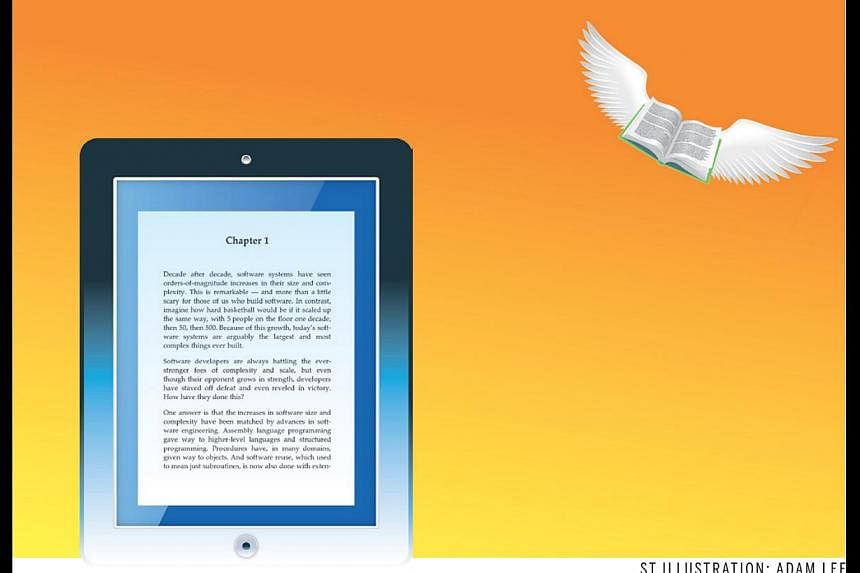When I read earlier this month that Sunny Bookshop would shut its doors on Wednesday, my first reaction was one of panic.
Where would I now unearth cut-price, out-of-print Agatha Christie paperbacks to add to my collection, left deliberately incomplete so I always have an excuse to duck into a used book store?
Where else could I access well-stocked stores of classic gems - Calvin & Hobbes, Stephen King, True Singapore Ghost Stories - by renting them for a few dollars each?
Most importantly, where would I go for my time capsule fix, to relive happier years when afternoons meant the end of the school day and the start of a good story book?
One by one, the chapters have already closed on the other literary institutions of my youth.
The Orchard Road book triangle where I spent so many hours avoiding homework as a teenager - Sunny Bookshop in Far East Plaza, Borders in Wheelock Place, Library@Orchard in Ngee Ann City - is no more.
Library@Orchard closed in 2007, although it is reopening in Orchard Gateway this year.
Borders shut in 2011, had a short-lived revival in Jurong, then disappeared again. Sunny Bookshop itself moved to Plaza Singapura in 2010.
Even the bookstores I frequented as a young adult have peddled their last pages: Harris in Great World City, Page One in VivoCity, Prologue in Ion Orchard.
I knew that only fellow book addicts would share my consternation.
So when I holidayed in Hong Kong with a journalist friend last week, I launched into my lament that the world was changing too fast.
"It's so sad that Sunny Bookshop is closing," I bemoaned. "Why must all good things come to an end?"
Her reply was like a slap in the face: "Huh, when was the last time you went to Sunny Bookshop?"
She was right, of course.
I had fallen into the Nostalgia Trap, where everything I've grown out of - actual books, CDs, Chinese medical halls, mom-and-pop provision shops, barbers - takes on a rose-tinted hue.
When any of these last bastions of a bygone era calls it a day, I join in the chorus of complaints about how modernday costs and conveniences are ruthlessly driving out traditional businesses, leaving behind only sterile, faceless, cookie-cutter corporations.
But it's precisely because I, and others like me, have relegated these items and retailers to our pasts that they are now being phased out.
As a Kindle owner, I almost never visit bookstores these days. I always feel a bit guilty entering a bookshop with my Kindle concealed in my bag like contraband, checking out the latest bestsellers so I can go home and download them on my device.
The last time I bought a CD was in 2010, when Jay Chou's The Era album came out. The following year, I sold my car; with no more CD player, I decided to buy all my songs on iTunes instead.
I haven't been to a Chinese medical hall or a barber since I was a kid, and while I still pop into the minimart near my parents' house, it's only when I have a desperate ice-cream craving at night.
Yet I unfairly wish other Singaporeans would do what I myself don't want to: patronise these establishments often enough so that I can still, if so inclined, walk past the institutions of my childhood without going inside.
In some cities, the co-existence of old and new seems more common, startlingly so for a Singaporean used to central planning and continuous redevelopment.
In Hong Kong, people walk past a wet market to get from the Tsim Sha Tsui MTR station to the designer label-filled Harbour City mall.
Near my hotel in Sheung Wan, cold- pressed juice cafes and trendy wine bars jostled with jade sellers and antique shops for an inimitably organic experience.
In Tokyo, shoppers hit the newest stores in the heart of Shibuya, then round the corner to eat at the same soba shop which their parents used to take them to.
Of course, high rents and evolving consumer tastes are wreaking changes in both cities too, but perhaps at a slower pace than in Singapore.
One reason these other set-ups survive longer may be because they adapt quickly. For instance, the long-standing shop near my home that sells rice bowls heaped with sashimi for a mere $7 takes orders via a vending machine. I pop in for a quick meal at least once a week.
A few months ago, when indie bookstore BooksActually held a sale to raise funds so it could buy its own property and avoid rising rents, I ordered a bunch of books to be sent to me in Tokyo.
I could do so not just because it has an online store and ships overseas, but also because it's created a successful niche by publishing local authors - whose works are not available on the Kindle.
It takes two to avoid the Nostalgia Trap: retailers that stay relevant, and consumers who actively help to keep them afloat.
For those that fall through the cracks, it's time to bid them a fond farewell, and let them go.


